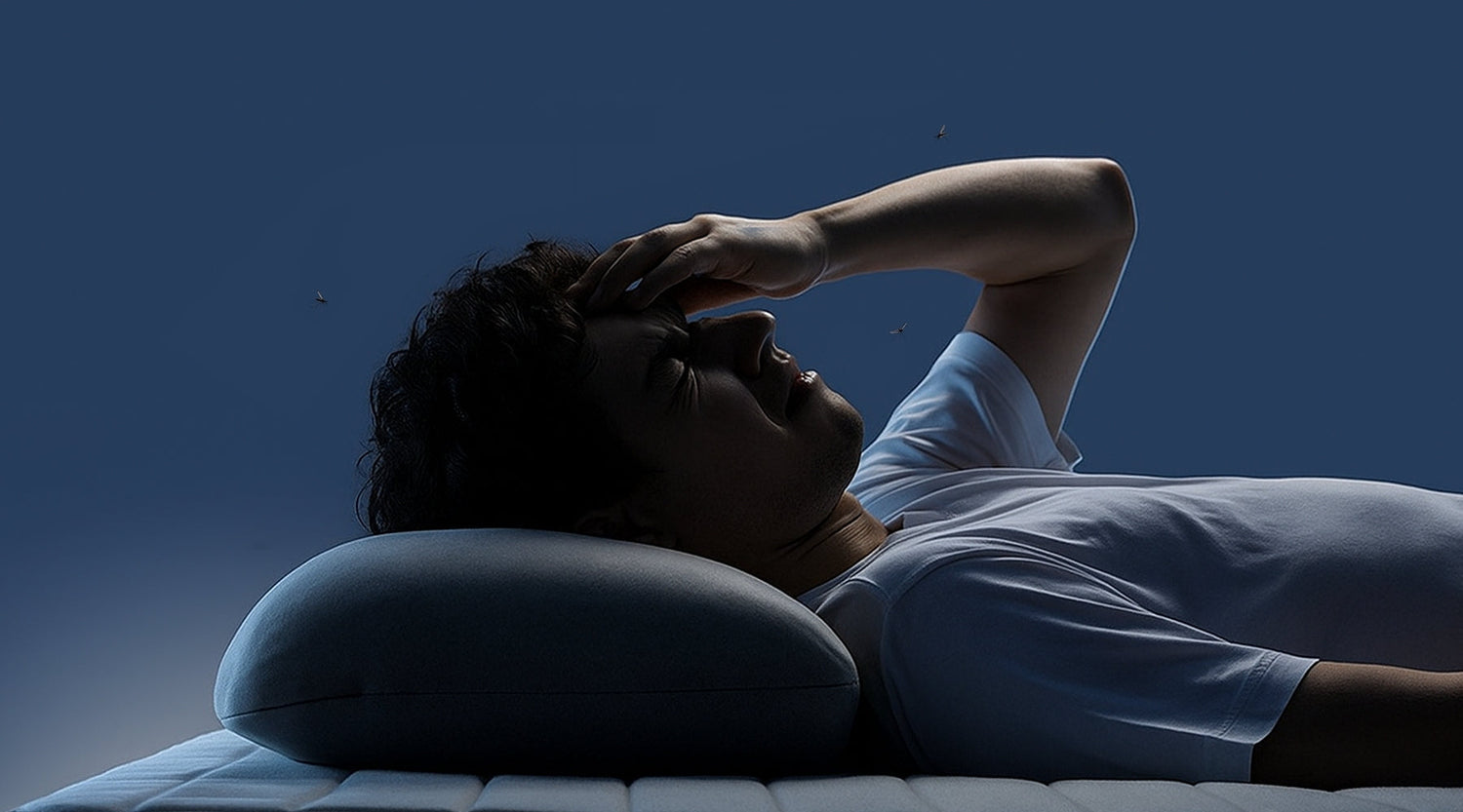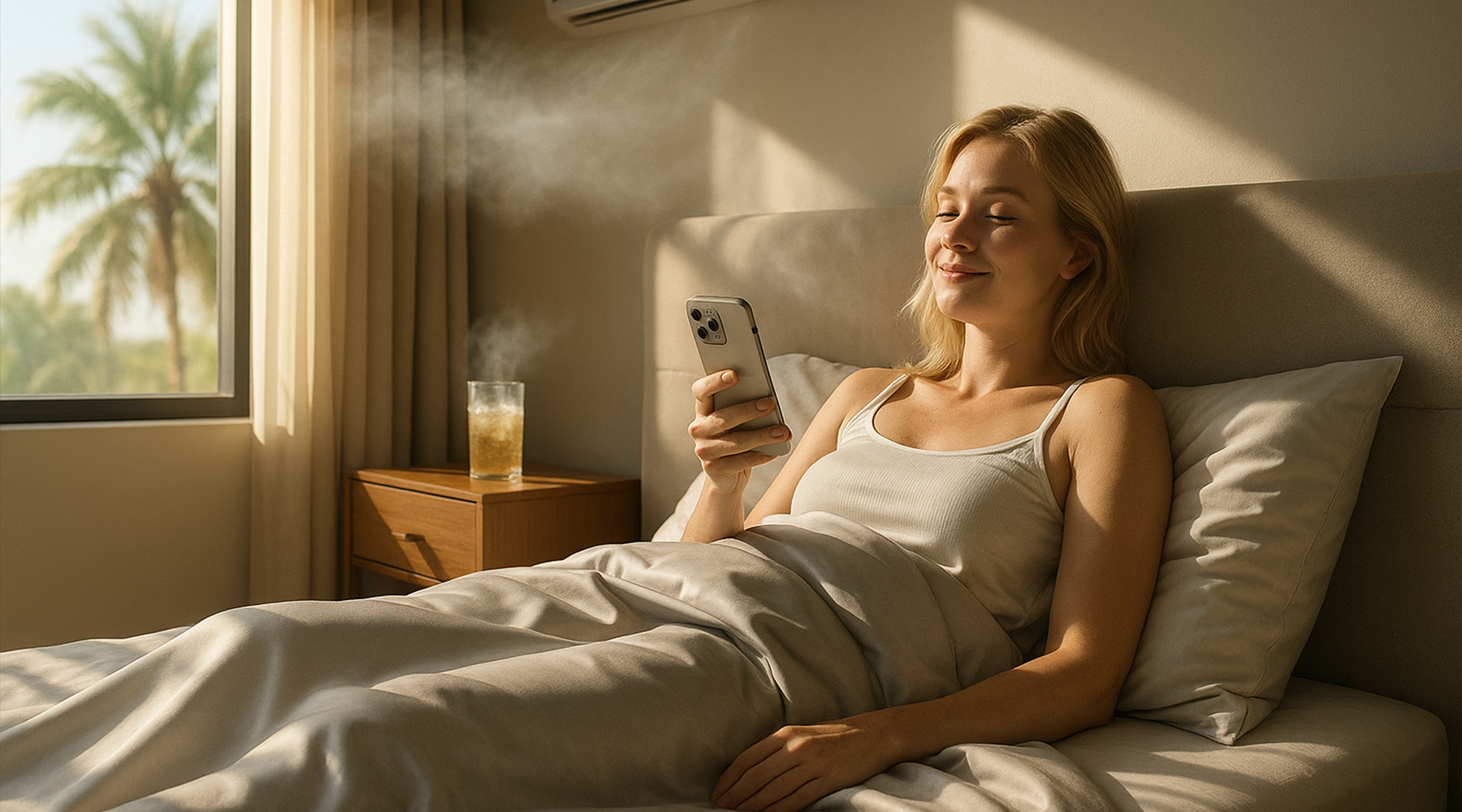That familiar, high-pitched buzz in the dark often signals a night of interrupted sleep, thanks to mosquitoes. In addition to the itchy bites, these bugs often make it hard to sleep, especially when it's warm outside and they're busy. This piece talks about how mosquitoes can make it hard to sleep, the health problems that can happen as a result, and how cooling sleep products can help make your bedroom less appealing to mosquitoes and more comfortable for you.
How Mosquitoes Directly Disrupt Your Sleep?
What mosquitoes do is more than just bother us with their buzzing; they also directly mess up our sleep cycles in a number of ways. The first is that their bites are very irritating to the skin. When the skin is pierced and saliva is injected, it sets off an immune reaction that causes itching, swelling, and often a lot of pain. This feeling can wake us up or keep us from going asleep at first. In addition, the high-frequency buzzing sound that their wings make is annoying to the ears and makes it hard to fall asleep. Because of this, the bites, itchiness, and buzzing often wake people up several times during the night. We can't get to the deeper, more restorative stages of sleep that are needed for both physical and mental healing because our sleep is broken up.
Some environmental factors make the mosquito problem a lot worse. Mosquitoes can lay their eggs better in warm places, and their metabolism speeds up when they're looking for blood. This makes them more busy and determined in their search. Mosquitoes also like it when it's wet, which usually happens when it's warm outside. Additionally, higher humidity levels can make people sweat more, which makes us even more appealing to these bugs.
Why Mosquitoes Find Us Appealing?
The way mosquitoes find their human hosts is a complex process that is based on a few main attractants. Body heat is one of the main cues. These bugs have special senses that can pick up on even the smallest changes in temperature coming from warm-blooded animals. Carbon dioxide, which is released when we breathe, is also a strong long-range attractant that mosquitoes use to find possible hosts from a long way away. Also, our sweat and natural body smells are big reasons why these pests are drawn to us. Mosquitoes are especially attracted to molecules like lactic acid and ammonia that are found in sweat.
We unintentionally make ourselves more open to mosquito bites while we sleep, especially when it's warm outside. It's possible that our skin temperature will stay high, giving us a bigger thermal signature. Also, greater sweating, which is a normal response to being hot, releases a mix of chemicals that make you feel attractive. Because of these things, we are more likely to get bitten by mosquitoes while we sleep.
Consequences of Mosquito-Induced Sleep Loss
Mosquitoes that bother people at night make it hard to get enough sleep. Not only does this make us tired, but it also affects our daily lives and can lead to long-term health issues.
Impacts on Mood, Concentration, and Energy
Interrupted sleep quickly takes a toll. In the short term, you might notice significant mood alterations, such as increased irritability, a shorter fuse, and heightened stress levels. Cognitively, the brain struggles; concentration becomes difficult, focus wanes, memory recall can be sluggish, and making clear decisions may feel more challenging. Unsurprisingly, daytime fatigue is an almost inevitable outcome. This manifests as reduced energy levels and a persistent grogginess that can substantially impair daily performance and overall productivity.
Weakened Immune Defenses and Chronic Health Risks
The problems don't necessarily stop after a few bad nights. If mosquito-induced sleep disruptions become a regular occurrence, leading to chronic sleep deprivation, the potential long-term health risks are a serious concern. A consistently weakened state from lack of sleep can compromise the immune system, leaving the body more vulnerable to infections. Furthermore, ongoing sleep loss is linked to an increased susceptibility to several chronic health issues. These can include cardiovascular problems, metabolic disorders such as diabetes, and even mental health conditions like depression or anxiety. Ultimately, the persistent theft of quality sleep by mosquitoes can lead to a significant reduction in overall quality of life and day-to-day well-being.
Cooling Your Sleep Space: A Strategy Against Mosquitoes and Discomfort
After understanding the havoc mosquitoes can wreak on our sleep, especially in the heat, finding effective countermeasures is essential. Cooling sleep products provide a practical way to fight back. They work by creating a micro-climate around you that is less inviting to mosquitoes and far more conducive to deep rest.
Key Cooling Products for Your Bed
Several types of cooling products are designed to achieve this temperature regulation.
Cooling Blankets
These are not your average blankets. They are crafted from breathable, heat-dispersing fabrics that actively prevent body heat from accumulating, helping you maintain a steady, comfortable temperature all night long.
Cooling Bedding Sets
Your sheets, pillowcases, and mattress surfaces can also be optimized for coolness.
- Cooling Sheets: Look for materials like bamboo, Tencel, or specific weaves of cotton such as percale. These are celebrated for their excellent breathability and moisture-wicking capabilities, drawing sweat away from your skin.
- Cooling Pillowcases: Similar materials used in sheets can keep the area around your head cool, a critical factor for comfortable sleep.
- Cooling Mattress Toppers and Pads: These add a cooler layer directly beneath you, significantly enhancing the cooling effect of your sleep setup.
Complementary Ways to Cool Your Sleep Environment
Beyond items directly on your bed, other methods can complement your efforts to create a cooler room.
Strategic Fan Use
Fans do more than just circulate air; they help dissipate the heat your body gives off and can make it harder for mosquitoes, which are not strong fliers and dislike drafts, to reach you.
Air Conditioning
If available, using an air conditioner to lower the overall room temperature creates an environment that is markedly less hospitable for mosquito activity and generally more comfortable for sleeping.
Comprehensive Strategies for a Mosquito-Free Sleep Zone
Creating a cool sleep environment, as we've discussed, is a powerful step in deterring mosquitoes. However, to build an even more effective shield against these pests and ensure truly peaceful nights, it's wise to incorporate a few additional, well-established strategies.
1. Block Entry with Physical Barriers
Physically blocking mosquitoes is highly effective. Use well-tucked mosquito nets over beds for personal protection during sleep, and ensure all window and door screens are intact and well-fitted to prevent mosquitoes from entering your home. Regularly inspecting screens for any damage is also important.
2. Remove Their Breeding Hotspots
Target mosquito populations by eliminating their breeding grounds. Since they lay eggs in standing water, regularly empty or securely cover any items that can collect water, such as flowerpot saucers, buckets, and unused tires. Keeping gutters clean and drains clear also prevents water stagnation, denying mosquitoes a place to multiply.
3. Apply Repellents When Necessary
For added defense in areas with high mosquito activity, or as a supplementary measure, insect repellents can be carefully used. Choose a repellent suitable for your needs and always apply it to skin or clothing according to the product label instructions, paying close attention to safety guidelines, especially for children.
Prioritize a Cool, Mosquito-Free Bedtime!
Mosquitoes pose a significant threat to restful sleep, especially in warm and humid conditions, leading to a cascade of negative consequences for our health and cognitive functions. However, cooling sleep products offer a promising and comfort-enhancing strategy to deter these pests by modifying the sleeper's immediate surroundings, reducing their attractiveness. By investing in a cooler sleep environment, perhaps through cooling blankets, breathable bedding, or even simple environmental adjustments like fans, you can significantly improve your chances of achieving more restful, uninterrupted sleep and, consequently, enhance your overall health and daily functioning.




Hinterlasse einen Kommentar
Diese Website ist durch hCaptcha geschützt und es gelten die allgemeinen Geschäftsbedingungen und Datenschutzbestimmungen von hCaptcha.